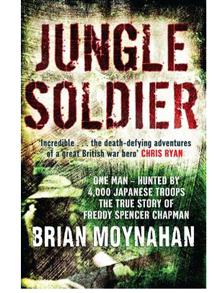One of our readers sent me a message about this book Jungle Soldier in. The title and intro sounded really good so I thought I’d go ahead and read it. I’m honestly not a huge reader. I used to work for Random House publishing and think I read 3 books the entire time I worked for them. But this book I honestly couldn’t put down and finished it in only 2 days. Facinating story and since I’m not the best book reviewer i’ve copied someone elses review in here which sums it all up. If you havn’t read this book you should.
While Freddy Spencer Chapman was being hunted by 4,000 Japanese soldiers through the jungles of Malaysia, it was assumed by his friends that he would not survive. Chapman, a special operations officer, had set out from Kuala Lumpur on a mission to sabotage Japanese supply lines. That was in January 1942, shortly before the fall of Singapore. When he emerged from the jungle three years later, he found his publisher had issued two of his books in a commemorative volume.
You couldn’t blame them. At one point Chapman was unconscious for 14 days with pneumonia and cerebral malaria. The jungle was full of scorpions, malaria-carrying mosquitos and midges that stung like wasps. But most dangerous of all were the Japanese. Their occupation of Malaya was marked by atrocities. To curb the resistance, they tortured and decapitated some Chinese and burned others alive in their homes.
Chapman, who in one 14-day period destroyed 40 vehicles, blew up eight trains and caused the death of 500 Japanese soldiers, knew what would happen to him if he were caught. What kind of man could survive in such circumstances? Brian Moynahan’s gripping book gives a fascinating insight into Chapman’s upbringing. Born in May 1907, his mother died early and his father left the country to escape bailiffs. After this, he was sent to the Lake District to live with a distant relative who was a God-fearing clergyman. There he became self-reliant and enterprising.Chapman met his father briefly in 1915 when he returned to England to volunteer for the Western Front. He was killed soon afterwards – Chapman suggested later that he had “lost interest in life”.
Chapman was strong but rootless. Recklessness kept depression at bay. At Cambridge he wrote in his diary: “I have no principles, scruples or morals whatever.” He needed to test himself to the limit, whether in blizzards in Greenland, while surveying a projected trans-Arctic air route, or kayaking in an ice-filled river. He climbed mountains in the Himalayas, where he once got caught in a blizzard and had to help down his exhausted sherpa. Stopping off in Tibet, he became one of the first Europeans allowed to watch the New Year celebrations in Potala, the capital city. He returned with 500 plant specimens for Kew Gardens.
When the war broke out, it was as if Chapman, then 32, had been preparing for it all his life. Made an officer in the SOE, he set off to fight the Japanese behind the lines, only to discover after a couple of weeks, that Singapore had surrendered. Six months later, he ran into a Japanese ambush: he was injured and the last of the European guerrillas with him was killed.
That marked the end of his active war: from then on his battle was to survive. Caked with blood, shaking with dysentery, he fell in with some Chinese police and guided them all to safety, after reading the stars. “As long as a man is reasonably fit,” he told himself, “the capabilities of the human body are almost unlimited.”
Hunted by the Japanese, who believed they were looking for a squad of 200 Australian commandos, he kept one step ahead of the enemy, teaching fieldcraft, when he could, to Chinese guerrillas in jungle camps.
Chapman was feted and decorated on his return. Both Wavell and Mountbatten thought he should have been given the VC. Yet even as he was being rescued by submarine off Pangkor Laut, something in him died. He later married and had three children but was too restless to settle down – Africa beckoned, then a succession of unglamorous teaching jobs back home. By August 1971, he was suffering bouts of serious depression; but the end still comes as a shock.
Jungle Soldier
by Brian Moynahan




